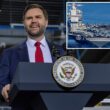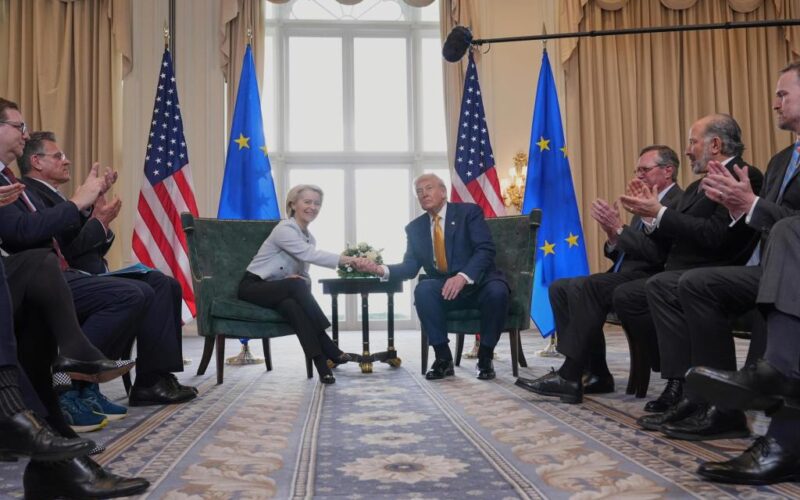By LORNE COOK
BRUSSELS (AP) — France’s prime minister described it as a “dark day” for the European Union, a “submission” to U.S. tariff demands. Commentators said EU Commission chief Ursula von der Leyen’s handshake with President Donald Trump amounted to capitulation.
The trouble is, Europe depends mightily on the United States, and not just for trade.
Mirroring Trump, Von der Leyen gushed that the arrangement she endorsed over the weekend to set U.S. tariff levels on most European exports to 15%, which is 10% higher than currently, was “huge.” Her staff texted reporters insisting that the pact, which starts to enter force on Friday, is the “biggest trade deal ever.”
A month after NATO Secretary-General Mark Rutte ingratiated himself with Trump by referring to him as “daddy,” the Europeans had again conceded that swallowing the costs and praising an unpredictable president is more palatable than losing America.
“It’s not only about the trade. It’s about security. It’s about Ukraine. It’s about current geopolitical volatility. I cannot go into all the details,” EU Trade Commissioner Maroš Šefčovič told reporters Monday.
“I can assure you it was not only about the trade,” he insisted, a day after “the deal” was sealed in an hour-long meeting once Trump finished playing a round of golf with his son at the course he owns in Scotland.
The state of Europe’s security dependency
Indeed, Europe depends on the U.S. for its security and that security is anything but a game, especially since Russia invaded Ukraine. U.S. allies are convinced that, should he win, President Vladimir Putin is likely to take aim at one of them next.
So high are these fears that European countries are buying U.S. weapons to help Ukraine to defend itself. Some are prepared to send their own air defense systems and replace them with U.S. equipment, once it can be delivered.
“We’re going to be sending now military equipment and other equipment to NATO, and they’ll be doing what they want, but I guess it’s for the most part working with Ukraine,” Trump said Sunday, sounding ambivalent about America’s role in the alliance.
The Europeans also are wary about a U.S. troop drawdown, which the Pentagon is expected to announce by October. Around 84,000 U.S. personnel are based in Europe, and they guarantee NATO’s deterrent effect against an adversary like Russia.
At the same time, Trump is slapping duties on America’s own NATO partners, ostensibly due to concerns about U.S. security interests, using Section 232 of the Trade Expansion Act, a logic that seems absurd from across the Atlantic.
Weaning Europe off foreign suppliers
“The EU is in a difficult situation because we’re very dependent on the U.S. for security,” said Niclas Poitiers at the Bruegel research institution in Brussels. “Ukraine is a very big part of that, but also generally our defense is underwritten by NATO.”
“I think there was not a big willingness to pick a major fight, which is the one (the EU) might have needed with the U.S.” to better position itself on trade, Poitiers told The Associated Press about key reasons for von der Leyen to accept the tariff demands.
Part of the agreement involves a commitment to buy American oil and gas. Over the course of the Russia-Ukraine war, now in its fourth year, most of the EU has slashed its dependence on unreliable energy supplies from Russia, but Hungary and Slovakia still have not.
“Purchases of U.S. energy products will diversify our sources of supply and contribute to Europe’s energy security. We will replace Russian gas and oil with significant purchases of U.S. LNG, oil and nuclear fuels,” von der Leyen said in Scotland on Sunday.
In essence, as Europe slowly weans itself off Russian energy it is also struggling to end its reliance on the United States for its security. The Trump administration has warned its priorities now lie elsewhere, in Asia, the Middle East and on its own borders.
That was why European allies agreed at NATO’s summit last month to spend hundreds of billions of dollars more on defense over the next decade. Primarily for their own security, but also to keep America among their ranks.
The diplomacy involved was not always elegant.
“Europe is going to pay in a BIG way, as they should, and it will be your win,” Rutte wrote in a private text message to Trump, which the U.S. leader promptly posted on social media.
Rutte brushed off questions about potential embarrassment or concern that Trump had aired it, saying: “I have absolutely no trouble or problem with that because there’s nothing in it which had to stay secret.”
A price Europe feels it must pay
Von der Leyen did not appear obsequious in her meeting with Trump. She often stared at the floor or smiled politely. She did not rebut Trump when he said that only America is sending aid to Gaza. The EU is world’s biggest supplier of aid to the Palestinians.
With Trump’s threat of 30% tariffs hanging over European exports — whether real or brinksmanship is hard to say — and facing the prospect of a full-blown trade dispute while Europe’s biggest war in decades rages, 15% may have been a cheap price to pay.
“In terms of the economic impact on the EU economy itself, it will be negative,” Poitiers said. “But it’s not something that is on a comparable magnitude like the energy crisis after the Russian invasion of Ukraine, or even COVID.”
“This is a negative shock for our economy, but it is something that’s very manageable,” he said.
It remains an open question as to how long this entente will last.
Mark Carlson in Brussels contributed to this report.
Originally Published:










